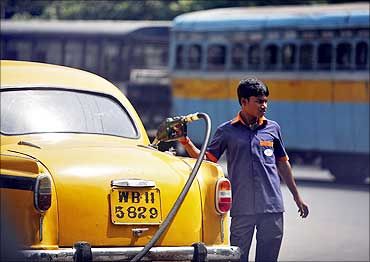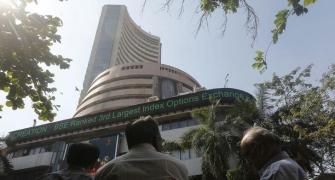Low fuel prices to help oil marketing and refining sectors but upstream players will stay under pressure.
 The cycle is down in energy fossil fuels such as crude, natural gas and coal. The prices of these started moving down about a year ago.
The cycle is down in energy fossil fuels such as crude, natural gas and coal. The prices of these started moving down about a year ago.
The downtrends have now intensified. The primary cause is low global demand. Projections for global GDP (gross domestic product) growth have reduced, as the slowdown in China gets more obvious.
The US is about the only major economy doing okay at the moment. Japan is near stagnation and euro zone is struggling.
Large emerging market (EM) economies like Brazil, Indonesia, Nigeria, South Africa and Russia are also in the doldrums. India is growing quicker than other EMs but it isn't large enough to make a significant difference to global growth.
There is crude and gas oversupply. The North American shale revolution released new supplies of "tight" oil and gas, which could not have been exploited earlier.
Opec (Organization of the Petroleum Exporting Countries) is also pumping crude oil without volume reductions. Iran is now re-entering the export market, from which it was forced out by sanctions. So, the over-supply could even increase.
Energy markets are sensitive to supply-demand mismatches. A little under-supply or over-supply leads to large price swings.
Crude oil prices are at multi-year lows and may drop further. Gas prices are down. Coal prices are at multi-year lows; demand has declined, partly due to China cutting back on coal use in power generation.
There are several ways in which prices could snapback in the short to medium term of one or two years. For example, conflicts in West Asia-North Africa might knock out supplies from Iraq or Libya, Iran might be hit by sanctions again, or Russia might face sanctions.
Opec might also cut production. Many traders believe it has maintained production at current levels to keep prices low and force the expensive shale operators of North America out of business. If this is indeed the objective, the strategy is succeeding.
In the June quarter, the 10 largest independent oil and gas producers in the US logged total losses of $15 billion, compared with total profits of $3.5 billion a year ago.
Oil prices have reduced 55 per cent and US Henry Hub gas prices have dropped 45 per cent in the past 12 months. If Opec does drive shale out of the market, it could then increase prices by cutting production.
While low prices last, India receives a windfall. Imports are lower in value in dollar terms. Inflation trends down, due to lower fuel expenses.
Subsidies reduce. "Underrecoveries" by public sector undertakings (PSUs) dropped to Rs 72,300 crore in 2014-15, from Rs 1,40,000 crore (Rs 1.4 trillion) in 2013-14. The 2015-16 Budget assumes Rs 30,000 crore (Rs 300 billion) on this account.
Upstream PSU, Oil and Natural Gas Corporation, and Oil India limited, will be spared the burden of sharing subsidy so long as crude stays below $60/barrel. The Direct Benefit Transfer scheme for gas has also reduced leakages.
Low crude oil prices has given leeway to decontrol the retail price of diesel. In turn, that has induced private refiners like Reliance and Essar to consider re-entry to the domestic retail market.
India could, therefore, soon see a more competitive retail regime. One downside is development of the upstream exploration and production sector will slow down.
Apart from issues with the current contractual regime, there is less interest simply because market prices are low.
The next auction of the New Exploration Licensing Policy (the 10th series) may not receive a great deal of attention. The government is said to be contemplating a move to Open Acreage and the next auction would be held under a new revenue-share formula. Things also haven't started moving on the shale gas and coal bed methane front, where activity is minimal.
Lower prices have also meant that "sensitive" subsidies on the gas front and in kerosene are not being tackled for political reasons. This is an ideal time to cut back and ideally, eliminate those.
Finally, there is no certainty that the government would not panic and reintroduce retail pricing controls if crude prices do rise.
In fact, such kneejerk action is not unlikely. But if conflicts don't escalate in WANA, energy fuel prices are likely to stay low for quite a while. India's oil-marketing and refining sector will do well.
There have been turnarounds in Bharat Petroleum Corporation, Hindustan Petroleum Corporation and Indian Oil Corporation. Essar has also done well.
The outperformance will continue until such time as there's a rise in crude prices (or policy is reframed badly). Players in areas such as gas distribution, LNG imports, pipeline transporters, and downstream users could also see enhanced investment and activity.
Conversely, upstream players such as ONGC, OIL and Cairn will remain under pressure.








